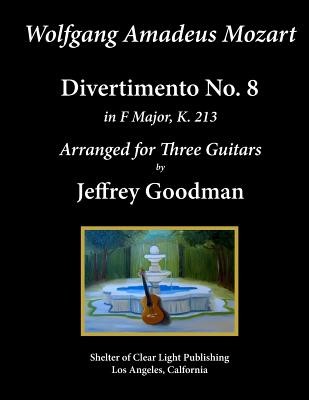
- We will send in 10–14 business days.
- Author: Jeffrey Goodman
- Publisher: CreateSpace Independent Publishing Platform
- ISBN-10: 1974012298
- ISBN-13: 9781974012299
- Format: 21.6 x 28 x 0.3 cm, softcover
- Language: English
- SAVE -10% with code: EXTRA
Reviews
Description
Mozart's Divertimento No. 8 in F major, K. 213, is one of five surviving wind sextets scored for two oboes, two horns, and two bassoons. Divertimenti, Cassations and Serenades were of the music genre called Tafelmusik (table music), and were played at social events such as weddings, graduations, and birthdays. Composed after his return from Italy to Salzburg in March of 1773, Mozart was just seventeen years old. During that year, among other compositions, he wrote six or seven symphonies, four divertimentos, six string quartets, a piano concerto, and a mass. There are five movements: Allegro spiritoso Andante Minuet and Trio Contredanse en Rondeau EDITORIAL APPROACH In this arrangement for three guitars, all of Mozart's original dynamics, phrasing indications and articulations for woodwinds have been preserved. The scarcity of dynamic and phrasing indications in almost all nineteenth century guitar music is a situation later generations of guitarists encounter and must deal with. Countless first editions of music by Fernando Sor, Mauro Giuliani, Dionisio Aguado and others are devoid of, or contain minimal performance indications. Among guitar composers, the underrated Czech composer and guitarist Wenzeslaus Thomas Matiegka (1773-1830) published his scores with a wealth of dynamic, articulation, and phrasing marks. However, his example was the exception, rather than the rule. Just as woodwind articulations are executed according to the instrument being played, guitarists can also explore and work out interpretive realizations of Mozart's score in a way suited to the guitar. iv
- Author: Jeffrey Goodman
- Publisher: CreateSpace Independent Publishing Platform
- ISBN-10: 1974012298
- ISBN-13: 9781974012299
- Format: 21.6 x 28 x 0.3 cm, softcover
- Language: English English
Mozart's Divertimento No. 8 in F major, K. 213, is one of five surviving wind sextets scored for two oboes, two horns, and two bassoons. Divertimenti, Cassations and Serenades were of the music genre called Tafelmusik (table music), and were played at social events such as weddings, graduations, and birthdays. Composed after his return from Italy to Salzburg in March of 1773, Mozart was just seventeen years old. During that year, among other compositions, he wrote six or seven symphonies, four divertimentos, six string quartets, a piano concerto, and a mass. There are five movements: Allegro spiritoso Andante Minuet and Trio Contredanse en Rondeau EDITORIAL APPROACH In this arrangement for three guitars, all of Mozart's original dynamics, phrasing indications and articulations for woodwinds have been preserved. The scarcity of dynamic and phrasing indications in almost all nineteenth century guitar music is a situation later generations of guitarists encounter and must deal with. Countless first editions of music by Fernando Sor, Mauro Giuliani, Dionisio Aguado and others are devoid of, or contain minimal performance indications. Among guitar composers, the underrated Czech composer and guitarist Wenzeslaus Thomas Matiegka (1773-1830) published his scores with a wealth of dynamic, articulation, and phrasing marks. However, his example was the exception, rather than the rule. Just as woodwind articulations are executed according to the instrument being played, guitarists can also explore and work out interpretive realizations of Mozart's score in a way suited to the guitar. iv


Reviews